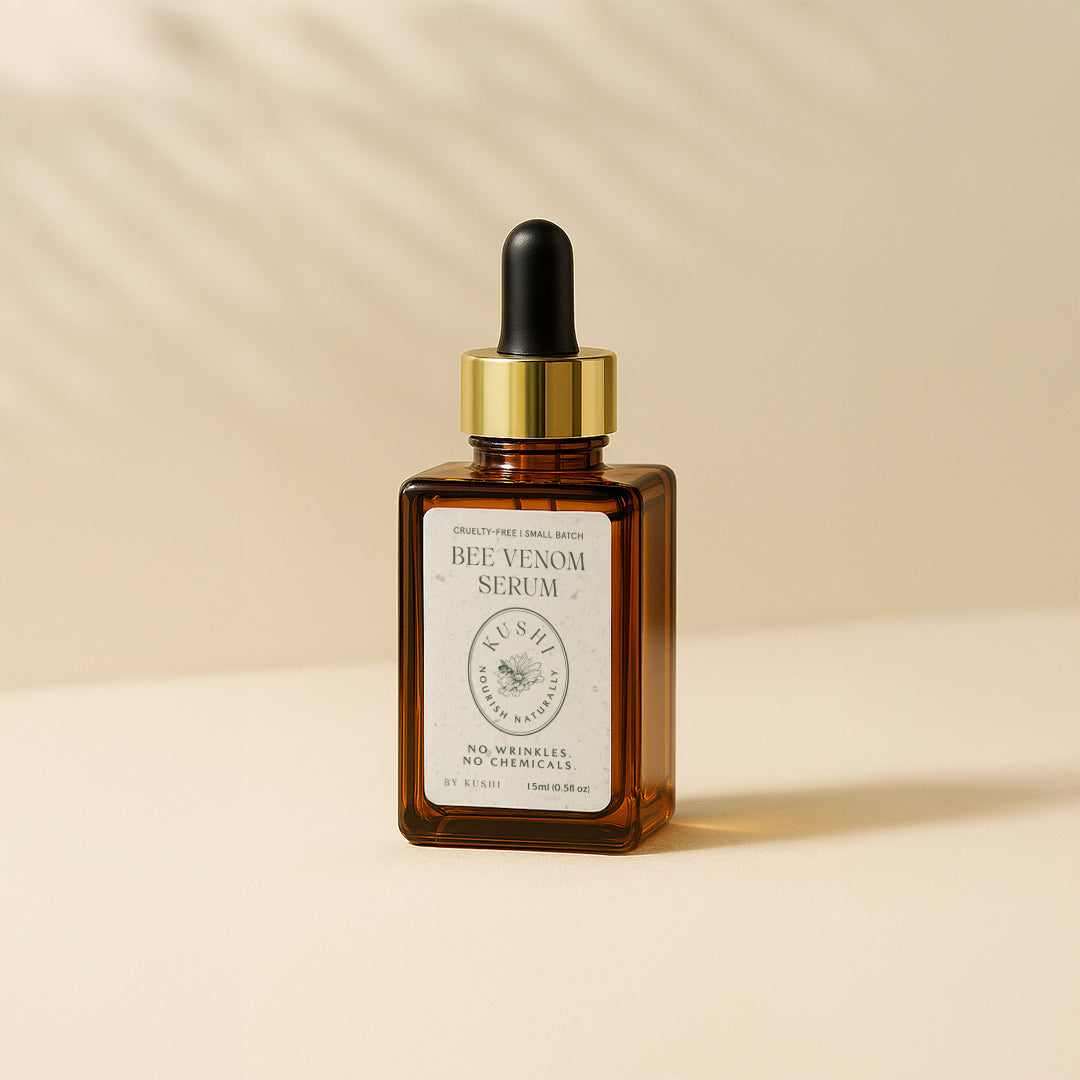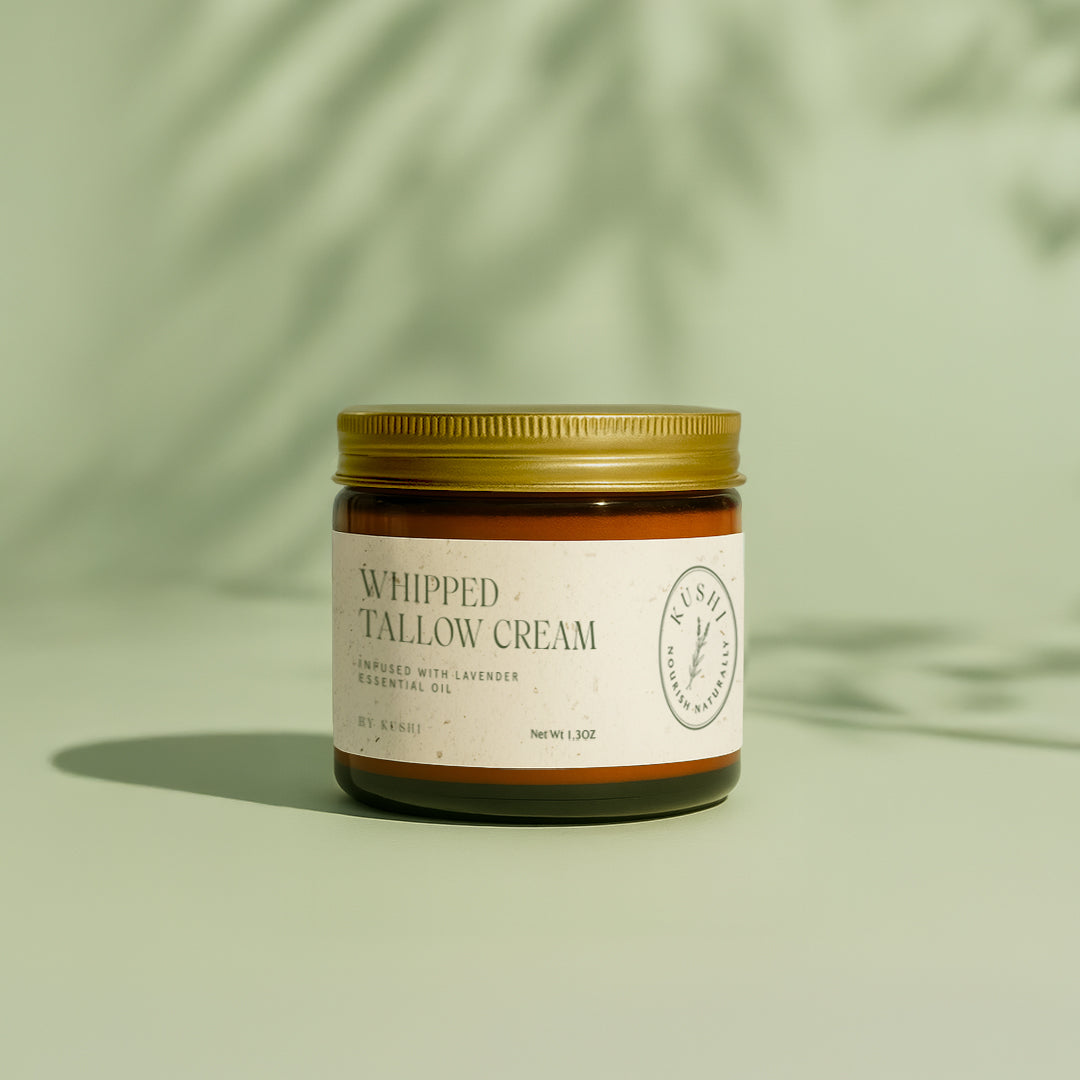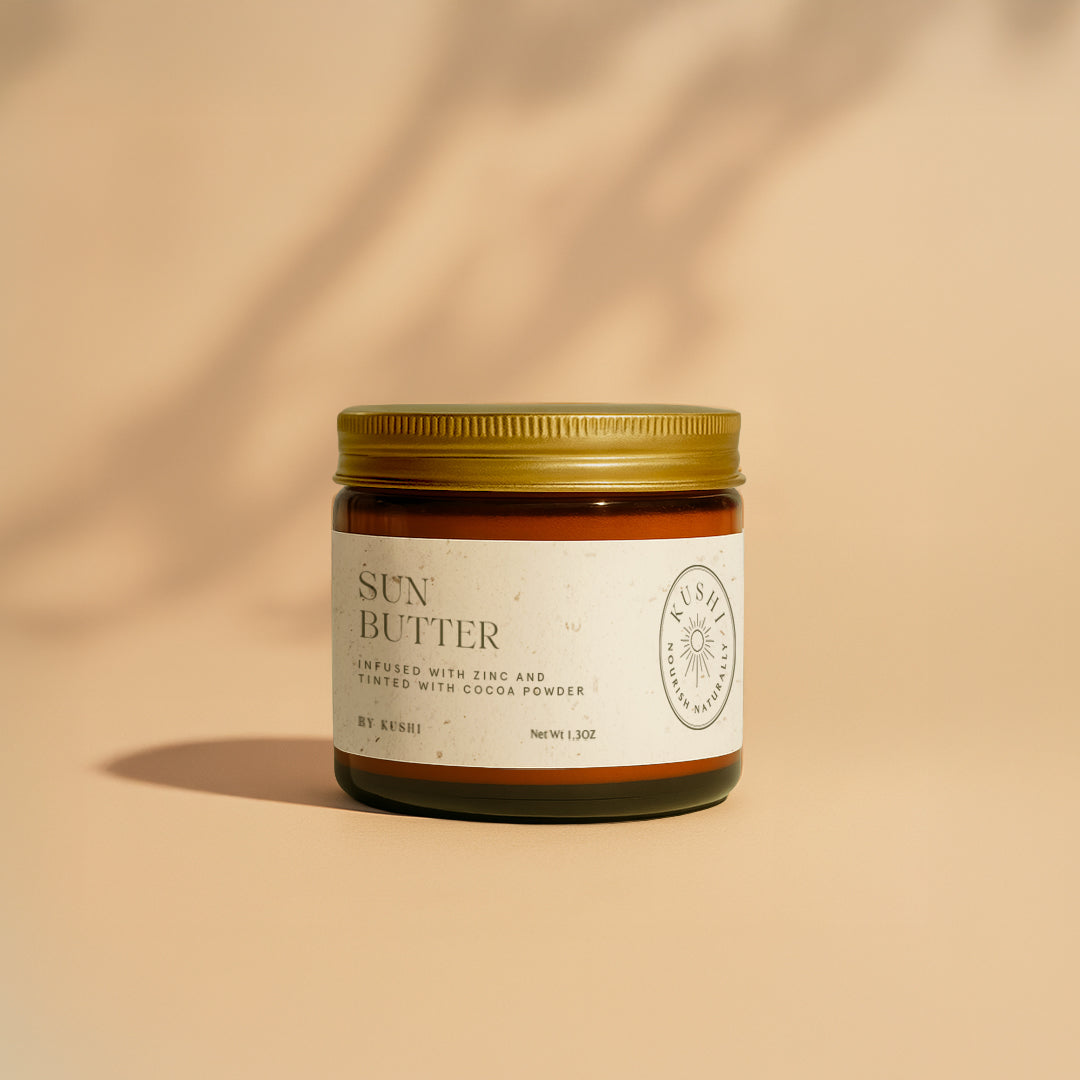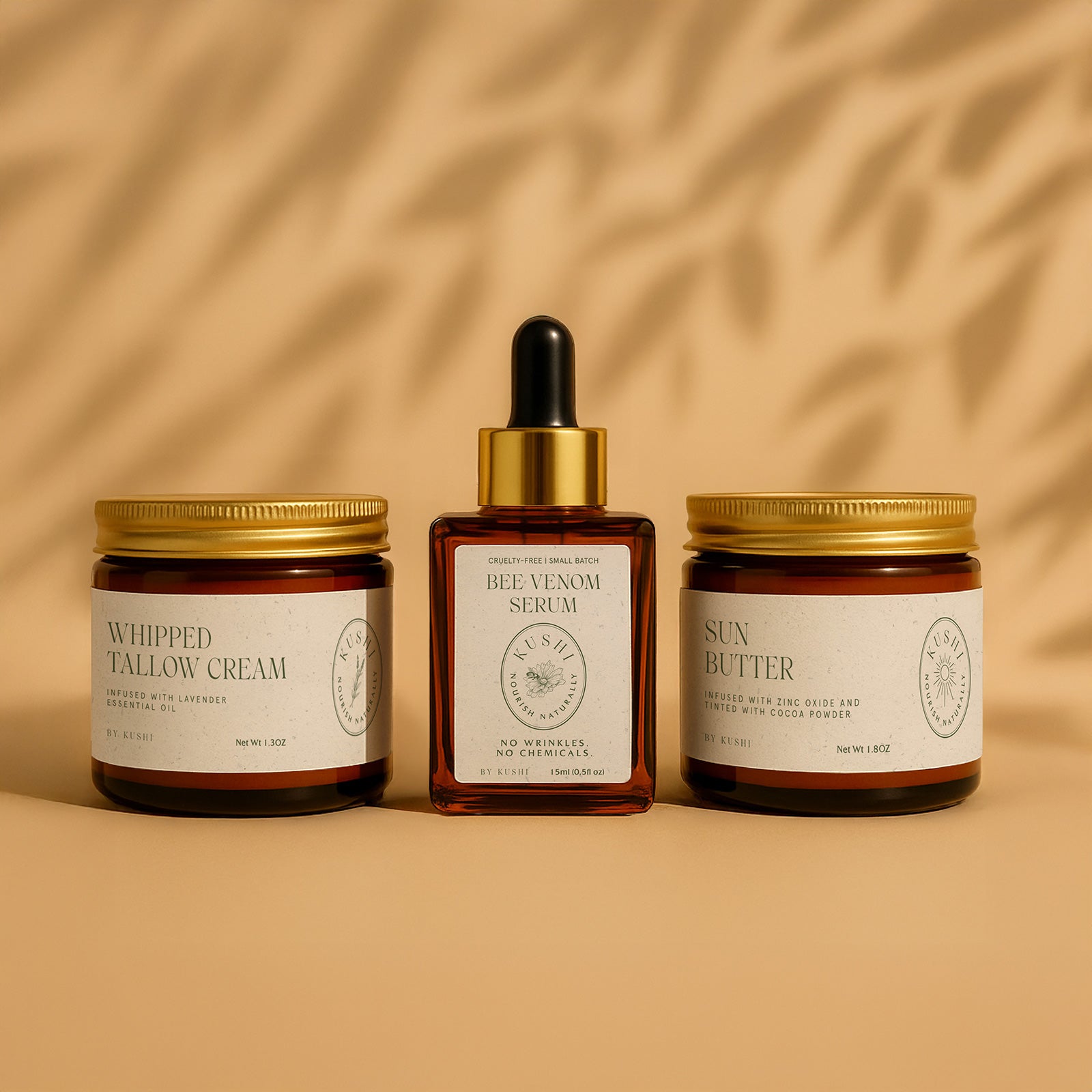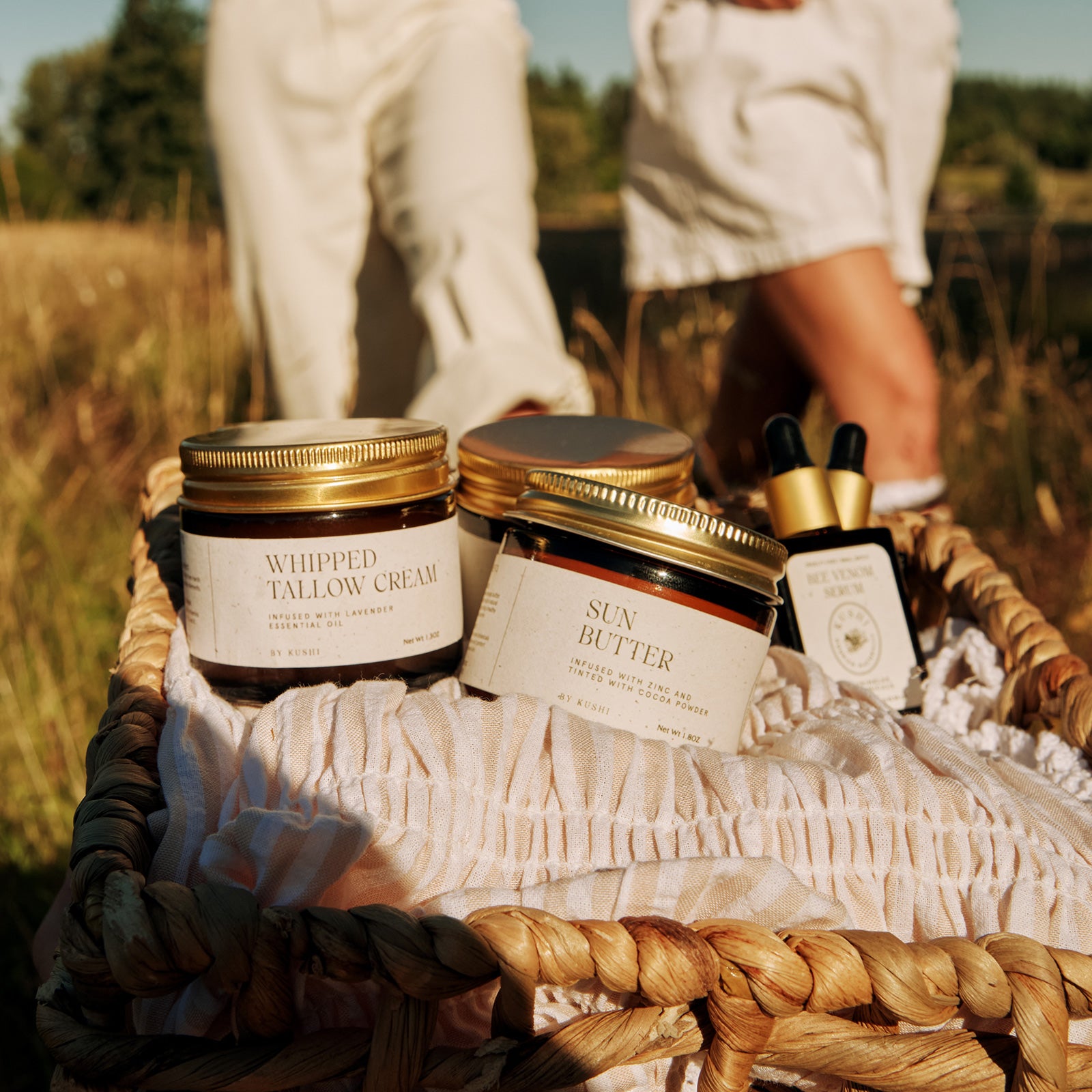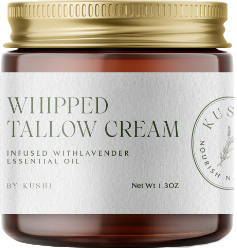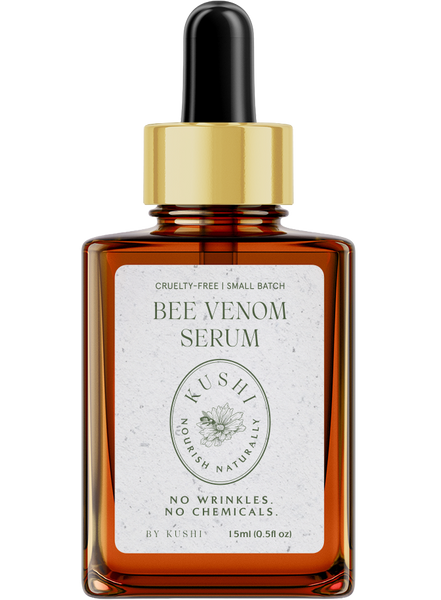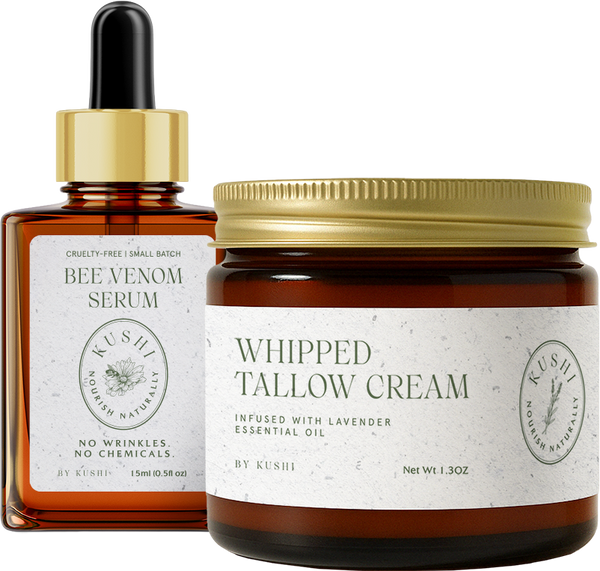Key Takeaways:
-
Clarification: Beef tallow does not replace SPF-rated sun protection but supports skin health when exposed to sunlight.
-
Formulation Insight: Combining beef tallow with zinc oxide creates a product that nourishes and protects, like our Sun Butter.
-
Skin Barrier Support: Tallow strengthens the skin’s barrier, helping it recover from sun exposure and environmental stressors.
Lately, a lot of attention has turned to one of our foundational ingredients: beef tallow. Some are calling it a “natural sunscreen.” Others are calling it a myth. The conversation has raised important questions, can beef tallow really protect your skin from the sun, or is this just another case of internet wellness gone too far?
At Kushi, we don’t follow trends, we revive the methods that kept generations before us healthy, glowing, and protected. Our formulations are powered by animal-based ingredients because we know the skin recognizes what’s natural, and thrives when given the raw materials it actually needs. From regenerative fats to mineral protection, we don't cut corners, and we never dilute nature’s intelligence.
Tallow is undeniably powerful. It's rich in bioavailable nutrients, deeply compatible with human skin, and supports barrier repair in ways most modern skincare can’t. But does that make it a sunscreen? The answer isn’t black and white, and that’s exactly why it matters.
In this piece, we’ll unpack the role of beef tallow in sun care, where it truly shines, and where it falls short, and how we’ve built that knowledge into our own product, Sun Butter.
What Is Beef Tallow And Why Is It Used In Skincare?
Beef tallow is a rendered form of fat derived from cattle, typically from the suet around the kidneys and loins. While it may sound old-fashioned or even unappealing at first, tallow has a long history of use in skincare, dating back centuries. The reason? Its composition is remarkably similar to the oils naturally produced by human skin.
Rich in vitamins A, D, E, and K, beef tallow delivers essential nutrients that support skin regeneration, hydration, and overall barrier health. Its saturated fats help seal in moisture and soothe irritation, making it a favorite among those with dry, sensitive, or eczema-prone skin.
At Kushi, we choose tallow not because it's trendy, but because it works. We carefully source grass-fed, high-quality beef tallow to ensure purity and nutrient density. In a world full of synthetic creams and complicated routines, tallow stands out for its simplicity and effectiveness.
Can Beef Tallow Really Work As Sunscreen?
Beef tallow on its own does not provide broad-spectrum UV protection in the way mineral sunscreens like zinc oxide do. However, it does offer some naturally occurring sun-protective properties. Tallow contains conjugated linoleic acid (CLA), stearic acid, and other fatty acids that support skin health and reduce inflammation, both of which are important in defending the skin against environmental stressors, including sun exposure.
Some anecdotal evidence suggests that people who use beef tallow regularly notice fewer sunburns, especially when it's combined with other natural ingredients. But this is not the same as measurable SPF protection.
To be clear: beef tallow alone should not replace your daily sunscreen. What it can do is support and enhance your skin’s natural resilience to the sun, when paired with other protective ingredients.
That’s exactly why we formulated our Sun Butter with both grass-fed beef tallow and non-nano zinc oxide. This way, you get nourishing skincare benefits and true UV protection, all in one formula.
Understanding Natural Sun Protection: What The Science Says
There’s a growing interest in natural skincare alternatives, and with that, a lot of claims about which ingredients offer true sun protection. In holistic circles, you’ll hear that ingredients like shea butter, red raspberry seed oil, and even beef tallow offer SPF-like benefits. But what does science actually say? At Kushi, we respect tradition, but we don’t stop there. We examine the data, the clinical research, and the way skin truly responds to both natural and mineral compounds. Because effective skincare doesn’t come from folklore alone, it comes from formulas that work.
Let’s take a closer look at what the research tells us about these “natural” sun protectants.
The Truth About Plant Oils And Natural Butters
Many natural ingredients commonly associated with sun protection, like raspberry seed oil or carrot seed oil, do contain antioxidants and may offer minor UV absorption properties. However, these claims are often based on outdated or non-clinical studies. Most of these oils do not have tested or consistent SPF values and should not be relied upon as standalone protection.
Beef Tallow’s Role In Barrier Defense, Not UV Blocking
Unlike zinc oxide or titanium dioxide, beef tallow doesn’t block or reflect UV rays. Its strength lies in supporting the skin barrier, reducing transepidermal water loss, and helping the skin recover from oxidative stress caused by sun exposure. Tallow keeps the skin resilient, but it doesn’t function as a UV shield.
Zinc Oxide: The Gold Standard In Mineral Sun Protection
Zinc oxide remains one of the few FDA-recognized ingredients for broad-spectrum UV protection. It sits on the skin’s surface and reflects both UVA and UVB rays. Unlike chemical sunscreens, it doesn't absorb into the bloodstream, making it a safer option, especially for sensitive skin. This is why it's the active protectant in our Sun Butter.
Why Blending Ingredients Matters
Some brands rely solely on trendy oils or misleading SPF claims. At Kushi, we formulate based on function and synergy. By combining beef tallow’s skin-repairing properties with the UV-blocking power of non-nano zinc oxide, we create sun care that truly protects, while nourishing deeply.
How Kushi Approaches Sun Care Differently
At Kushi, we don’t believe you should have to choose between clean ingredients and real protection. Many commercial sunscreens rely heavily on synthetic chemicals, some of which can irritate sensitive skin or disrupt the skin’s natural balance. On the other hand, some “natural” alternatives use ingredients with little to no proven efficacy when it comes to actual sun defense. Our approach is to bridge that gap, combining the wisdom of traditional skincare with science-backed protection.
Our Sun Butter is a reflection of this philosophy. We use grass-fed beef tallow for its rich nutritional profile and its ability to support skin barrier function. This is paired with non-nano zinc oxide, a mineral sunscreen agent that offers true broad-spectrum protection. To further support skin health, we include botanical oils like raspberry seed and carrot seed, which bring their own antioxidant and barrier-supportive properties to the blend.
This isn’t about chasing trends. It’s about honoring what has worked for generations and refining it into something that meets modern needs. Skincare should work with your body, not against it.
Why We Use Beef Tallow In Our Sun Butter
At Kushi, every ingredient we choose has a purpose, and beef tallow is no exception. While many brands overlook it in favor of trendier oils or lab-made emollients, we rely on tallow for its unmatched compatibility with human skin. It’s not a gimmick or a nod to tradition for tradition’s sake. It’s science-backed, skin-approved, and central to what makes our Sun Butter so effective.
Let’s break down why it plays such an important role in our formulation.
Skin-Nourishing Nutrients That Actually Work
Beef tallow is packed with fat-soluble vitamins A, D, E, and K, nutrients that directly support skin repair, elasticity, and hydration. Unlike synthetic additives or unstable plant oils, these vitamins occur naturally in tallow and are delivered in a form the skin easily recognizes and utilizes.
Supports And Strengthens The Skin Barrier
The skin’s lipid barrier is critical for maintaining moisture and protecting against environmental stressors. When exposed to the sun, this barrier can become depleted, leading to dryness, sensitivity, or premature aging. Tallow helps replenish and reinforce this barrier, making skin more resilient in the face of UV exposure.
Superior Absorption Compared To Plant Oils
Many oils used in natural skincare sit on the surface of the skin, feeling greasy or evaporating quickly. Beef tallow, however, mimics the structure of human sebum, allowing it to penetrate deeply and deliver nourishment where it's needed most, without clogging pores or leaving a residue.
Tallow + Zinc Oxide: A Balanced And Protective Duo
On its own, beef tallow isn’t a sunscreen. But when paired with non-nano zinc oxide, like we use in our Sun Butter, it creates a dynamic formulation. Zinc provides the broad-spectrum UV protection, while tallow keeps the skin soothed, moisturized, and balanced, especially during prolonged sun exposure.
Final Thoughts
Beef tallow may not be a sunscreen in the traditional, SPF-rated sense, but calling it a skincare myth overlooks its true value. While it shouldn't replace zinc oxide or other proven sun-blocking ingredients, tallow absolutely deserves a place in the conversation about natural sun protection. Its ability to nourish, repair, and strengthen the skin barrier makes it a powerful ally in any sun care routine.
At Kushi, we don’t lean into hype or half-truths. We build products like Sun Butter based on what the skin actually needs: protection, nourishment, and ingredients it recognizes. By pairing beef tallow with non-nano zinc oxide and supportive plant-based oils, we offer a solution that’s both deeply restorative and genuinely protective.
So, is beef tallow sunscreen? Not on its own. But is it a skincare powerhouse that supports healthy, resilient skin in the sun? Absolutely.
Read Also:
Frequently Asked Questions About Beef Tallow As Sunscreen
Is beef tallow comedogenic or likely to clog pores?
Beef tallow has a comedogenic rating of 2, meaning it may clog pores in acne-prone individuals but is generally well-tolerated on dry or sensitive skin types.
Can beef tallow offer any antioxidant benefits under sun exposure?
Yes, tallow contains natural antioxidants like vitamin E, which may help neutralize some oxidative stress from sun exposure, although it's not a UV filter.
Does the source of beef tallow (grass-fed vs. grain-fed) matter for skincare?
Absolutely. Grass-fed beef tallow contains a higher concentration of beneficial nutrients like CLA and vitamin K2, which enhance its skincare benefits.
How long does beef tallow stay effective on the skin when exposed to sun and sweat?
Tallow has a stable, long-lasting fatty acid profile, but it doesn't bind to the skin the way traditional sunscreens do, so it wears off more easily with sweat or water.
Can beef tallow be combined with essential oils for enhanced sun protection?
Some people blend it with oils like carrot seed or raspberry seed oil, which have mild natural SPF properties, but these are not substitutes for true UV blockers.
Is beef tallow safe for children’s skin under sun exposure?
Beef tallow is generally gentle and non-toxic, but it lacks SPF. If used on children, it should be combined with a proven mineral sunscreen like zinc oxide.
What’s the shelf life of beef tallow-based skincare products?
When stored properly in a cool, dry place, beef tallow products can last 12–18 months due to their stable saturated fat content and low oxidation rate.
Are there any skin types that should avoid beef tallow?
Oily and acne-prone skin types may find tallow too rich or pore-clogging, especially if used in large quantities or mixed with heavy oils.
Sources:
- Russell, M. F., Sandhu, M., Vail, M., Haran, C., Batool, U., & Leo, J. (2024, May 24). Tallow, rendered animal fat, and its biocompatibility with skin: A scoping review. Cureus, 16(5), e60981. https://doi.org/10.7759/cureus.60981
- Bai, X., Yan, J., Gilchrest, B. A. (2023, August 24). Next‑generation zinc oxide‑based sunscreens: molecular characteristics and advantages. Journal of Investigative Dermatology, 144(2), 430‑434.e1. https://doi.org/10.1016/j.jid.2023.07.020
- Araki, S. M., & Baby, A. R. (2025). New perspectives on titanium dioxide and zinc oxide as inorganic UV filters: advances, safety, challenges, and environmental considerations. Cosmetics, 12(2), 77. https://doi.org/10.3390/cosmetics12020077
- Khan, A. U. H., Liu, Y., Fang, C., Naidu, R., Shon, H. K., Rogers, Z., & Dharmarajan, R. (2023). A comprehensive physicochemical characterization of zinc oxide nanoparticles extracted from sunscreens and wastewaters. Environmental Advances, 12, 100381. https://doi.org/10.1016/j.envadv.2023.100381
